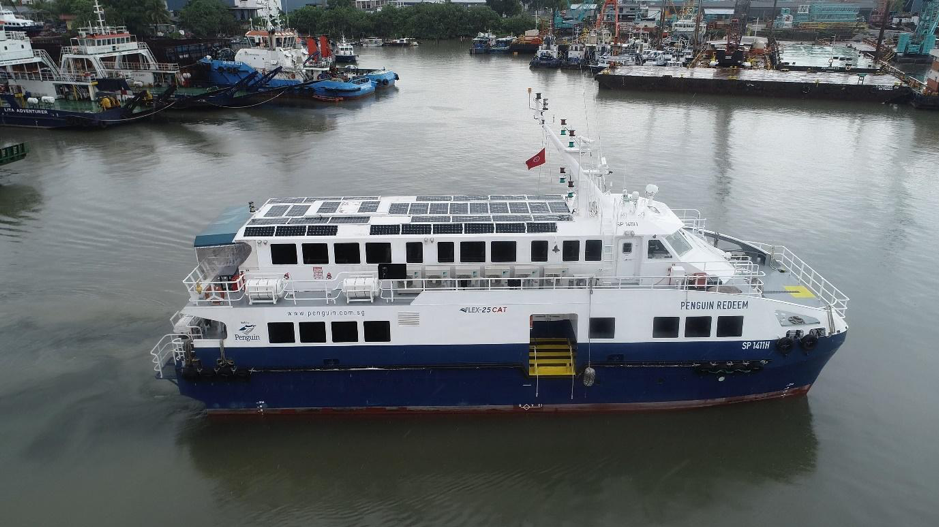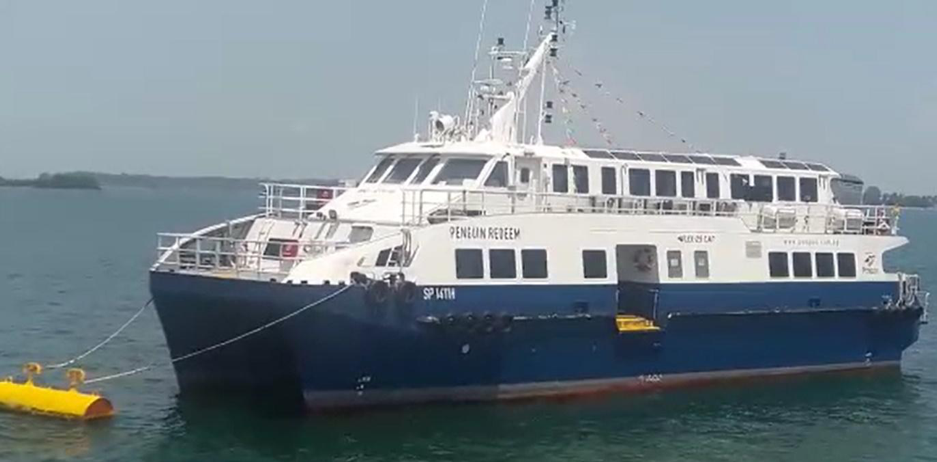
Penguin Redeem servicing Pulau Bukom comes with solar panels at the rooftop
Located five kilometres to the south of Singapore lies Pulau Bukom, which was once Singapore's oil storage facility over 125 years ago. Today, it has become one of the most important production sites for Shell, serving as an integrated oil and petrochemical manufacturing facility.
Since 2016, Penguin has been operating daily passenger ferry services from Pasir Panjang Ferry Terminal for Shell Eastern Petroleum Pte Ltd. During an average weekday, an estimated total of 5,000 passengers are transported by Penguin and other ferry operators servicing Pulau Bukom. Almost all the passengers are Shell employees and contractors. During refinery turnaround periods, the daily passenger load could rise to as high as 7,000.
Strict safety requirements by Shell
Kasandra See, HSE Manager of Penguin shared that Shell requires their ferries to be operated by at least seven crew each, exceeding the stipulated minimum manning requirements of six crew. This is because of the high passenger volumes and constantly choppy waters at the Pasir Panjang Ferry Terminal, which requires extra vigilance during passenger movements between the jetty and the vessel.
In line with the high operational demands, a new Master serving the Pulau Bukom route has to undergo a mandatory route and vessel familiarisation for at least three working days, shadowed by the existing Master before being allowed to operate independently.
Shell has also issued a safety circular to its vessel operators, which consists of the following stipulations:
- Maintain a minimum safe speed (< 5 knots) while departing/approaching the jetties. Speed to be reduced to a minimum (< 5knots) starting from 100m from the jetties.
- While departing/approaching jetties, use minimum engine movements as possible.
- Maintain a minimum distance of 100m from the jetties while waiting to berth and provide enough sea room for departing ferries.
- While navigating in hours of darkness with clear visibility, maximum allowed speed is 18 knots.
- Lookouts to always use binoculars while vessel is underway, with specific emphasis during hours of darkness. Lookouts to raise all safety alerts to the Master immediately.
Enforcing strict safety rules
Penguin works hand-in-hand with Shell to enforce strict rules on passenger behaviour at the ferry terminals and on board ferries.
"At the ferry terminals, there are ample signages, physical barricades, security personnel and our own operations staff to ensure that passengers walk in an orderly manner and queue up. When approaching the ferry, passengers will be greeted by one crew member stationed at the gangway to ensure that everyone makes it across safely," explained Kasandra.
"In addition, Shell strictly enforces a unique but praise-worthy policy of no mobile phone usage while passengers are walking from the ferry terminal to the vessel and vice versa. Passengers are occasionally reminded by the security personnel and vessel crew to look up from their mobile phones." We ought to implement such a policy in many other places."
Penguin also ensures that safety is observed while disembarking the ferry. When the ferry is approaching the jetty, the Master will play a message on the public announcement system to remind all passengers to remain seated until they are safe to disembark. Disembarking is done in an orderly manner according to passenger zones. Three different bells will ring to signal passengers in each of the three zones. "You are not allowed to stand up until you hear 'your bell'," said Kasandra.
Multi-levels of safety assessments
As safety is of utmost importance for a site like Pulau Bukom, Kasandra shared that multiple levels of safety assessments have been implemented.
"Our ferries are subject to annual and unannounced ad-hoc inspections by Shell, while the Classification Society carries out their checks during annual dockings at our shipyard. In addition, staff from Pelican Ship Management regularly conduct checks, both scheduled and unscheduled, on our vessels," she said.
As part of the Shell safety regime, Kasandra said that passengers are also empowered and encouraged to report any unsafe acts or conditions observed on board their ferries through Shell's Fountain Incident Management (FIM) reporting system.
Learning and improving from past incidents

After the safety incident, Penguin Redeem is now moored with two ropes
While no major incidents have occurred thus far due to Penguin's strict safety system, Kasandra shared that they take every opportunity to review and improve safety.
"In 2018, we encountered a case of near-miss when a sudden swell swept onto the ferry terminal and parted a mooring rope from one of our ferries that was alongside the jetty. The vessel drifted from the jetty, dislodging the gangway in the process, which ended up dangling from the ferry while being held by the end of a safety rope," said Kasandra.
Fortunately, no one was hurt, and no property was damaged in the incident apart from the mooring rope.
As a result of the near-miss, Penguin and Shell carried out a thorough joint safety review of mooring ropes being used for all the ferries. "The conclusion was that existing mooring ropes being used were fine. However, we just needed to add an extra step of conducting daily checks on the ropes to ensure that frayed and worn-out ropes are promptly replaced,"
"Following the incident, we now double-moor our ferries when they are alongside the jetty. This is a new standard operating procedure that arose from the near-miss incident," shared Kasandra.

